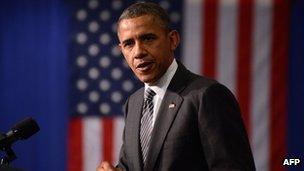Global survey shows drop in support for Barack Obama
- Published

Confidence in Barack Obama is still high in Europe but has dropped in China and Japan
International approval of US President Barack Obama's foreign policy has dropped sharply during his term in office, a Pew Research survey suggests.
Among the 21 countries surveyed, the largest drop in approval - from 57% to 27% - was seen in China, <link> <caption>the Global Attitudes Project reveals</caption> <url href="http://www.pewglobal.org/2012/06/13/global-opinion-of-obama-slips-international-policies-faulted/" platform="highweb"/> </link> .
Most respondents in almost all countries opposed US drone strikes.
The figures come months before the president seeks re-election, with polls showing a close race with Mitt Romney.
Foreign policy does not traditionally play a key role in US presidential elections, but Mr Obama's campaign has trumpeted his foreign policy record - including killing Osama Bin Laden - amid ongonig criticism of his record at home.
Despite the drop in overall support, confidence in Mr Obama remains high among US allies, especially in Europe, the Pew survey shows.
"I think where you see the real disappointment is when you deal with specific policies," said Richard Wike, associate director of the Pew Global Attitudes Project.
He added that the survey showed big gaps between expectation levels and action over Mr Obama's policies on climate change and treatment of the Israeli-Palestinian conflict.
Economic power
According to Mr Wike, confidence in Mr Obama and approval of his international policies has trended downward during the course of his presidency, but has not dropped sharply in a single year.
Besides China, the largest declines in foreign policy approval by 2012 included long-term ally Japan and neighbour Mexico.
Among five European countries surveyed both in 2009 and 2012, approval of Mr Obama's international policies dropped from 78% to 63%. In five Muslim countries surveyed in both years, the approval rate dropped from 34% to 15%. Russia also joined the countries with double-digit declines, from 40% of respondents approving US international policies to 22%, an 18% decrease.
While Mr Obama generally has higher approval ratings than President George W Bush did at the end of his second term, their approval ratings are now matched in Pakistan and Mr Obama's remain only slightly better in Lebanon.
Among the countries surveyed there was widespread opposition to US drone strikes. At least 50% of respondents in 17 countries disapproved of such strikes, with the largest percentages in the Middle East, Mexico and Greece.
In recent weeks, Mr Obama has become more closely associated with the US drone programme, with a New York Times report noting he personally approves each strike, and that the US keeps a "kill list" of potential strikes against militants.
In addition to changes in sentiment towards Mr Obama and his policies, the survey records a shift in the way economic power is perceived.
Majorities in Germany, Britain, France and Spain now regard China as the world's leading economic power, not the US. In the UK, this percentage has doubled since 2008.
Mr Wike told the BBC the US had seen a downward trend in its perceived economic power since the 2008 financial crisis and subsequent recession, despite Mr Obama receiving "reasonably good marks on global economic issues".
However, American "soft power" gets higher marks, especially among young respondents.
The American way of doing business is popular in the Middle East, with more than 50% in Lebanon, Tunisia, Jordan and Egypt saying they like this part of US image.
Majorities or pluralities in 18 of 20 countries admire US science and technology, according to the survey. American ideas about democracy are more popular among respondents under 30 in several countries, including Tunisia and China.
- Published5 June 2012
- Published6 June 2012